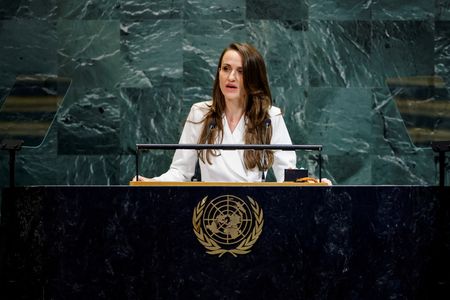By William Schomberg
LONDON (Reuters) -Bank of England interest rate-setter Catherine Mann said on Tuesday she thought Britain’s inflation rate had become persistently high – although that did not mean further interest rate cuts were completely off the table.
“For those of you who might have read the August Monetary Policy Report … there was an inflation persistence scenario in that,” Mann told a seminar organised by the Financial Times and S&P Global Market Intelligence.
“I believe that that inflation persistence scenario is playing out,” she added.
In August, the BoE set out a potential scenario where a combination of weak productivity growth and fast-rising wages led to more lasting inflationary pressure than in its main forecast, which sees inflation returning to target by mid-2027.
But uncertainty over the economic outlook means that further reductions in borrowing costs cannot be ruled out, she said.
Mann voted with a majority of the Monetary Policy Committee members this month to keep the BoE’s benchmark Bank Rate unchanged. In August she was in the minority who opposed a cut to 4%.
The BoE expects inflation to hit 4% in September but it is also worried about a slowdown in economic growth.
Earlier on Tuesday, BoE Deputy Governor Clare Lombardelli said central banks should be careful about assuming that inflation shocks are temporary.
Another MPC member Megan Greene last week called for a cautious approach on cutting rates while Governor Andrew Bailey said he thought borrowing costs would fall but it was not clear when or by how much. On Monday, Deputy Governor Dave Ramsden said he was confident rates could be cut further.
At the MPC’s September meeting, Mann voted for the BoE to reduce its government bond holdings at a more gradual pace than that chosen by the majority of the committee’s members.
A slower pace of quantitative tightening would avoid having to sell too many medium-dated gilts and allow a more cautious approach as Britain’s financial system adjusts to a less ample central bank reserves framework.
“I think we’re closer than other people think to a more upward sloping, steeper sloping part of the reserves demand curve,” she said, adding that she disagreed with the BoE’s decision this month to skew sales away from long-dated gilts.
(Writing by William SchombergEditing by David Milliken and Gareth Jones)










